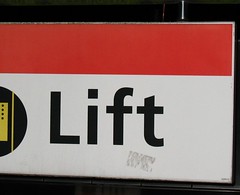 |
| lift (Photo credit: emmma peel) |
In 2010, the United States Department of Justice released the final regulations concerning the addition of pool lifts in public swimming areas. While the original law was to be fully implemented by March of this year (2012), a new deadline has been levied that extends the requirements to January 31st, 2013. The announcement of this extension has re-ignited the debates that initially swarmed while the legislation was being proposed and amended.
The law itself states that public swimming facilities must be equipped with ways to allow disabled individuals to enjoy the same usage as others. The purported way to achieve this utilitarian standard is through installing technology outside of the pool for usage. Because of this, the act is considered an extension of the Americans with Disabilities Act, or ADA. What specifically constituted a "pool lift" was left vague enough to prevent a single company or conglomerate from creating a monopoly. There was plenty of specificity in regards to what constituted a public swimming facility, however. Such things include, but aren't limited to, hot tubs, hotel pools, and walking pools.
It is important to note that, according to the fine print, there is no mandate that every single pool be equipped with a device. That would be like saying that every building could no longer have stairs, but must use ramps instead. The legislation purports equality in opportunity. Meaning that if there are multiple pools and aquatics programs, those with disabilities must be able to enjoy the same programs and usage of aquatic facilities. I.e, if they have two pools, as long as they are both fundamentally congruent, only one of the pools have to be equipped with the technology.
There are those who openly embrace and laud the law. To them, this action is another step forward in achieving de facto equality in America. Why is it fair, their argument goes, to deny and deprive certain Americans of opportunities simply because they can't gain access to the pool? Especially if, once in the water, they would be able to take advantage of the opportunity? For them, it is an issue of fundamental fairness and the implementation of the law represents a step in the right direction.
There are those who openly embrace and laud the law. To them, this action is another step forward in achieving de facto equality in America. Why is it fair, their argument goes, to deny and deprive certain Americans of opportunities simply because they can't gain access to the pool? Especially if, once in the water, they would be able to take advantage of the opportunity? For them, it is an issue of fundamental fairness and the implementation of the law represents a step in the right direction.
There are those, however, who disagree with the law. Although many do indeed sympathize with those who can't use the pool because they can't gain access to it, the issue boils down to economics. The mandate for the inclusion of the technology doesn't just apply to new construction; older pools must also have this technology in place. As of now, it is up to the proprietor to foot the bill for the expansion. Indeed, once one realizes that each device can run up to several thousand dollars, the economic arguments are, in some aspect, merited.



Nice information! I am intimidated by the excellence of information. There are a lot of high-quality funds here. I am sure I will visit this site again soon. I know something information just like this,to know you can click Swimtown Pools. Hope you like it. Thanks
ReplyDeleteGood share,.
ReplyDeleteThanks for sharing this information,
buy cccam
This is really a helpful and interesting share,.
ReplyDeleteAndroid TV Box Dublin Ireland Smart TV
This comment has been removed by the author.
ReplyDelete